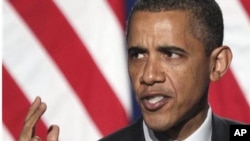With a little more than a month until a deadline to raise the nation's debt limit, President Barack Obama met on Monday with the top U.S. Senate Democratic and Republican leaders to try to narrow differences in long-running talks on reducing government deficit spending and raising the government's borrowing limit.
The president met for about half an hour in the morning with Senate Majority Leader, Democrat Harry Reid, who left without speaking to reporters. Senate Minority Leader, Republican Mitch McConnell came later in the day and also made no immediate comments to the media.
At a White House news briefing, Press Secretary Jay Carney quoted Mr. Obama as saying "everyone in the room" believes that a significant deficit reduction deal "remains possible," but that such a deal will require tough choices by Democrats and Republicans.
"If everyone is willing to abandon the 'my way or the highway' [my way only] approach to accept that compromise on behalf of the American people requires touch choices, we can get significant deficit reduction done this year," said Carney.
Carney said the president and his fellow Democrats have shown themselves willing to make touch choices, but that Republicans need to "take on some of their sacred cows" [be willing to modify their positions on issues they consider important], citing Republican resistance on ways to increase government revenue.
Vice President Joe Biden led several rounds of negotiations, trying to reach a compromise on reducing government spending. Republicans withdrew from the talks last week and the talks are now suspended.
The bigger picture includes an August 2 deadline to raise the government's $14.3 trillion debt ceiling. Any compromise agreement would have to give Congress time to act ahead of that date.
Raising the debt limit always sparks intense partisan debate in Congress. But lawmakers have voted to do so several times over the decades, under Democratic and Republican presidents.
The Obama administration and economists say failure to raise the borrowing limit and a potential government default on obligations amid a weak economic recovery could push the U.S. economy back into recession.
Republicans want to reduce government spending in an amount equal to any increase in the debt limit. President Obama's proposals include eliminating tax subsidies for oil and gas companies, and limiting tax deductions for wealthier Americans.
Senator McConnell has repeated the Republican position that raising taxes will not resolve the deficit problem and will not pass in Congress. On the Senate floor before his Monday meeting with the president, he said that any proposal for tax increases or spending increases linked to the debt ceiling should be "taken off the table"
"Not only are they counterproductive from the standpoint of an economic recovery, they are also politically impossible, since Republicans oppose tax hikes and Democrats have already shown that they won't raise taxes in a down economy either," said McConnell.
After meeting with President Obama last week, Democratic Representative Chris Van Hollen asserted that Republicans are placing the economy at serious risk where the debt ceiling is concerned.
"These people are playing with fire and really putting the very fragile economy at greater threat by playing the games that we have been seeing," said Van Hollen.
White House spokesman Carney on Monday reiterated a key administration talking point that "significant progress" was made in negotiations that went into "abeyance" after key Republicans withdrew last week.
Carney called it important not to "test" the broadly-held view that a government default would be "calamitous." And he repeated the White House view that Republican deficit cutting proposals have not been balanced.
The president's spokesman said nothing about a possible joint negotiating session that Mr. Obama might have in addition to his one-on-one talks with key congressional leaders.












